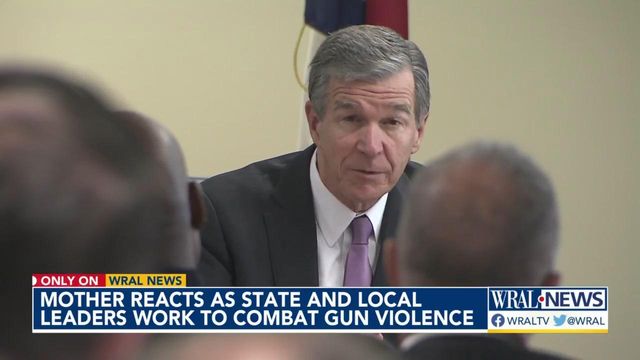Cooper, Stein call for stricter gun laws as NC police chiefs gather to talk gun violence, needs
Police chiefs from around the state came to Raleigh Monday for a meeting with the governor. Time and again they said they need more ways to deal with people in mental health crises.
Posted — UpdatedPolice chiefs from around the state met Monday with Gov. Roy Cooper and Attorney General Josh Stein to discuss gun violence, and to share a laundry list of police force needs.
Cooper and Stein reiterated their calls for stricter gun laws during the listening session, and particularly for red flag laws, which allow a judge, once convinced someone is a danger to themselves or others, to temporarily take that person’s guns.
Stein said North Carolina should raise the age to buy a semi-automatic rifle, including AR-15’s, from 18 years old to 21. He noted 18 year olds can’t buy alcohol, but they can buy high-powered rifles used in so many mass shootings.
“It makes no sense,” Stein said.
Cooper’s deputy secretary for juvenile justice, Billy Lassiter, said in a presentation to the chiefs that many people bought their first gun during the pandemic, during which there has been an upswing in sales, and that they need to be educated about safe storage. Often, when a young person hurts themselves or others with a gun, the weapon came from their home or a relative’s home, Lassiter said.
Lassiter said some children have gotten guns out of unlocked cars.
“They’re not locking that car,” he said. “They’re leaving that gun on the front seat.”
Lassiter said the state is planning a series of public service announcements on safe gun storage.
The chiefs had a number of requests for Cooper, Stein and Cooper’s secretary of public safety, Eddie Buffaloe, all of whom took notes. Among the requests:
Tougher penalties for firing a gun, even if no one is injured. Winston-Salem Police Chief Catrina Thompson said that when someone fires a gun, schools lockdown, businesses lock down, life is disrupted and there should be “more severe felony charges.”
State-funded incentives to help police departments attract and retain officers.
More willingness from the state Alcoholic Beverage Control Commission to revoke liquor licenses at establishments with frequent problems. Several chiefs complained that owners are able to get those licenses back, or they simply find someone else to put their name on the license and reopen.
Bail reform. Several chiefs said they’d like to see more uniformity in the bonds magistrates set, as well as higher bonds in some cases. Charlotte-Mecklenburg Police Chief Chief Johnny Jennings said his officers are frustrated by “the revolving door” of criminals they arrest returning to the street.
The issue cited most often: mental health. The chiefs repeatedly said they need more and better options to deal with people in a mental health crisis, beyond arresting them or taking them to the emergency room.
Cooper closed the meeting by saying there was a lot of work to do and that he hoped to meet with police chiefs on a more regular basis. Monday’s meeting was not publicly announced, but WRAL News learned of the meeting and was allowed to sit in.
“I don’t think there has ever, ever been a more difficult time to be a law enforcement officer than now,” Cooper said. “All of the stress and strains that you and your force and our communities are experiencing, it is a difficult job.”
Related Topics
• Credits
Copyright 2024 by Capitol Broadcasting Company. All rights reserved. This material may not be published, broadcast, rewritten or redistributed.






